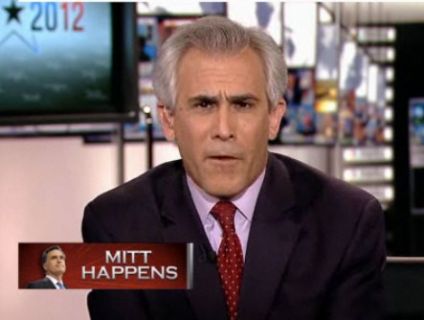At the private fundraiser held May 17 where Republican presidential candidate Mitt Romney candidly spoke about political strategy—noting that he saw half of the American electorate as freeloaders and “victims” who do not believe in personal responsibility—he discussed various foreign policy positions, sharing views that he does not express in public, including his belief that peace in the Middle East is not possible and a Palestinian state is not feasible.
Mother Jones has obtained video of Romney at this intimate dinner and has confirmed its authenticity. The event was held at the home of controversial private equity manager Marc Leder in Boca Raton, Florida, with tickets costing $50,000 a plate. During the freewheeling conversation, a donor asked Romney how the “Palestinian problem” can be solved. Romney immediately launched into a detailed reply, asserting that the Palestinians have “no interest whatsoever in establishing peace, and that the pathway to peace is almost unthinkable to accomplish.”
Romney spoke of “the Palestinians” as a united bloc of one mindset, and he said: “I look at the Palestinians not wanting to see peace anyway, for political purposes, committed to the destruction and elimination of Israel, and these thorny issues, and I say there’s just no way.”
Romney was indicating he did not believe in the peace process and, as president, would aim to postpone significant action: “[S]o what you do is, you say, you move things along the best way you can. You hope for some degree of stability, but you recognize that this is going to remain an unsolved problem…and we kick the ball down the field and hope that ultimately, somehow, something will happen and resolve it.”
Romney did note there was another perspective on this knotty matter. He informed his donors that a former secretary of state—he would not say who—had told him there was “a prospect for a settlement between the Palestinians and the Israelis.” Romney recalled that he had replied, “Really?” Then he added that he had not asked this ex-secretary of state for further explanation.
Here’s Romney’s full response; he starts out saying he has “two perspectives,” but as he answers the question, it turns out that’s not really the case:
I’m torn by two perspectives in this regard. One is the one which I’ve had for some time, which is that the Palestinians have no interest whatsoever in establishing peace, and that the pathway to peace is almost unthinkable to accomplish. Now why do I say that? Some might say, well, let’s let the Palestinians have the West Bank, and have security, and set up a separate nation for the Palestinians. And then come a couple of thorny questions. And I don’t have a map here to look at the geography, but the border between Israel and the West Bank is obviously right there, right next to Tel Aviv, which is the financial capital, the industrial capital of Israel, the center of Israel. It’s—what the border would be? Maybe seven miles from Tel Aviv to what would be the West Bank…The other side of the West Bank, the other side of what would be this new Palestinian state would either be Syria at one point, or Jordan. And of course the Iranians would want to do through the West Bank exactly what they did through Lebanon, what they did near Gaza. Which is that the Iranians would want to bring missiles and armament into the West Bank and potentially threaten Israel. So Israel of course would have to say, “That can’t happen. We’ve got to keep the Iranians from bringing weaponry into the West Bank.” Well, that means that—who? The Israelis are going to patrol the border between Jordan, Syria, and this new Palestinian nation? Well, the Palestinians would say, “Uh, no way! We’re an independent country. You can’t, you know, guard our border with other Arab nations.” And now how about the airport? How about flying into this Palestinian nation? Are we gonna allow military aircraft to come in and weaponry to come in? And if not, who’s going to keep it from coming in? Well, the Israelis. Well, the Palestinians are gonna say, “We’re not an independent nation if Israel is able to come in and tell us what can land in our airport.” These are problems—these are very hard to solve, all right? And I look at the Palestinians not wanting to see peace anyway, for political purposes, committed to the destruction and elimination of Israel, and these thorny issues, and I say, “There’s just no way.” And so what you do is you say, “You move things along the best way you can.” You hope for some degree of stability, but you recognize that this is going to remain an unsolved problem. We live with that in China and Taiwan. All right, we have a potentially volatile situation but we sort of live with it, and we kick the ball down the field and hope that ultimately, somehow, something will happen and resolve it. We don’t go to war to try and resolve it imminently. On the other hand, I got a call from a former secretary of state. I won’t mention which one it was, but this individual said to me, you know, I think there’s a prospect for a settlement between the Palestinians and the Israelis after the Palestinian elections. I said, “Really?” And, you know, his answer was, “Yes, I think there’s some prospect.” And I didn’t delve into it.
After saying all that, Romney emphasized that he was against applying any pressure on Israel: “The idea of pushing on the Israelis to give something up to get the Palestinians to act is the worst idea in the world.”
On his campaign website, Romney, whose foreign policy advisers include several neocons known for their hawkish support for Israel, does not explicitly endorse the peace process or a two-state solution to the Israeli-Palestinian conflict. But the Republican Party platform does state unequivocal backing for this outcome: “We envision two democratic states—Israel with Jerusalem as its capital and Palestine—living in peace and security.” The platform adds, “The US seeks a comprehensive and lasting peace in the Middle East, negotiated between the parties themselves with the assistance of the US.”
In public, Romney has not declared the peace process pointless or dismissed the two-state solution. In July, when the Israeli newspaper Haaretz asked Romney if he supports a two-state solution and the creation of a Palestinian state, he replied, “I believe in a two-state solution which suggests there will be two states, including a Jewish state.” Yet Romney’s remarks to these funders—this was one of his longest answers at the fundraiser—suggest he might be hiding his true beliefs regarding Israel and the peace process and that on this subject he is out of sync with the predominant view in foreign policy circles that has existed for decades.
Throughout the hourlong fundraiser, Romney discussed other foreign policy matters with his patrons, especially Iran. He repeated the tough talk he has issued on the campaign trail, but he also provided an odd reason for drawing a red line with Tehran about its nuclear program:
If I were Iran, if I were Iran—a crazed fanatic, I’d say let’s get a little fissile material to Hezbollah, have them carry it to Chicago or some other place, and then if anything goes wrong, or America starts acting up, we’ll just say, “Guess what? Unless you stand down, why, we’re going to let off a dirty bomb.” I mean this is where we have—where America could be held up and blackmailed by Iran, by the mullahs, by crazy people. So we really don’t have any option but to keep Iran from having a nuclear weapon.
Romney didn’t appear to understand that a dirty bomb—an explosive device that spreads radioactive substances—does not require fissile material from a nuclear weapons program. Such a bomb can be produced with, say, radioactive medical waste. If Iran’s nuclear program poses a threat, it is not because this project will yield a dirty bomb.
Talking to these funders, Romney also demonstrated that his campaign-long efforts to criticize Obama’s handling of foreign policy in simplistic and exaggerated terms—he’s an appeaser, he’s an apologist—are not reserved for public consumption. Romney told these well-to-do backers that the president is a naïf with an oversized ego:
The president’s foreign policy, in my opinion, is formed in part by a perception he has that his magnetism, and his charm, and his persuasiveness is so compelling that he can sit down with people like Putin and Chávez and Ahmadinejad, and that they’ll find that we’re such wonderful people that they’ll go on with us, and they’ll stop doing bad things. And it’s an extraordinarily naive perception.
Romney did share a disappointment with his patrons, noting it was “frustrating” to him that on a “typical day” when he does several fundraising events, “the number of foreign policy questions I get are between zero and one.” He complained that “the American people are not concentrated at all on China, on Russia, Iran, Iraq.” But at this fundraiser, Romney received several queries related to national security—and was afforded the opportunity to tell his financial backers what he does not (and will not) tell the public.
Video production: James West, Adam Serwer, Dana Liebelson, Erika Eichelberger, and Tim McDonnell.
Research assistance: James Carter













